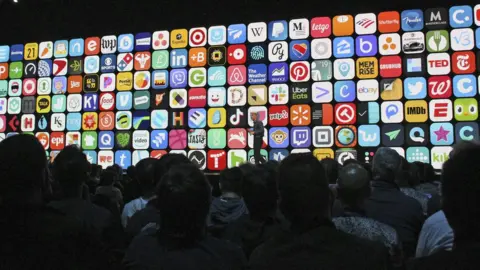Apple's annual developer showcase overshadowed by app row
 Getty Images
Getty ImagesApple is facing mounting pressure over how it runs its app store ahead of its major global developers' conference, which starts on Monday.
The firm has been accused of creating "hostile" policies within its fee structure, and is dealing with two EU competition probes announced this week.
But it is also embroiled in a row with some of its own developers.
That has now widened into a debate involving politicians and other major technology firms.
Apple's Worldwide Developers Conference often features new product announcements but is mainly an event for software developers working on Apple's platforms - some of whom are now voicing discontent about its pricing.
The argument was ignited in part by an email app called Hey, created by developer David Heinemeier Hansson. It had an update rejected by the Apple app store early this week because it does not allow in-app purchases - from which Apple takes a 30% cut.
Allow X content?
Many developers do not offer in-app subscriptions to avoid that levy - or raise the price of in-app subscriptions for the end user.
But not all apps are affected, Mr Hansson says. He pointed to email apps from Gmail and Microsoft's Outlook, which he says are treated differently, but which Apple would not discuss with him.
Hey's annual subscription of $99 (£80) is available only directly from the company online, and the app does not tell users where to buy it - so the firm believed it was following all the rules, similar to other email apps.
But Apple told him the app should never have been approved in the first place - and could be removed.
"If we don't like the deal Apple is offering us - which is to either pay them 30% or get kicked out - what are we going to do about that? Where are we going to go?" he told the BBC.
'Outrageous' decision
"If you launch a new piece of software today, and you're not available on the iPhone, you're invisible."
The cry has now been taken up by others, including blogger John Gruber, whose blog, Daring Fireball, is widely read among Apple developers. He wrote that if Hey's issues were not a mistake, the decision was "outrageous".
Such issues are behind an anti-competition probe announced by the EU this week, prompted by a complaint from Spotify. The Swedish firm also takes issue with Apple's approach to charging subscriptions and the cut it takes.
The anti-competition probe, coinciding with the row over Hey's business model, has snowballed into a much bigger argument.
Microsoft President Brad Smith entered the debate, saying that regulators on both sides of the Atlantic should have a "focused conversation" about app stores and the rules in place - though he did not mention Apple by name.
Microsoft has itself been the subject of competition probes, hit with hefty fines over its dominant market position with Microsoft Windows and its web browser.
But he said the restrictions and demands placed on developers today are far higher than anything that existed 20 years ago, at the height of Microsoft's software dominance.
Facebook, meanwhile, told the New York Times that its Gaming app had been rejected from Apple's app store five times.
Sources who spoke to the newspaper said it might be because the app offers simple games that do not have to be downloaded in the traditional way - through Apple's store.
Even the chairman of the House antitrust committee - the group of politicians that deals with competition law in the United States - has voiced his concern.
"Because of the market power that Apple has, it is charging exorbitant rents - highway robbery, basically - bullying people to pay 30% or denying access to their market," David Cicilline told The Verge.
"It's crushing small developers who simply can't survive with those kinds of payments. If there were real competition in this marketplace, this wouldn't happen."
The committee has asked the heads of major tech companies - including Tim Cook at Apple - to attend a session about competition in the tech sector. Mr Cook, it is reported, has yet to agree to attend.
But despite the international attention on Apple's policies, its head of marketing, Phil Schiller, told Techcrunch the company was not considering any changes to its rules.
